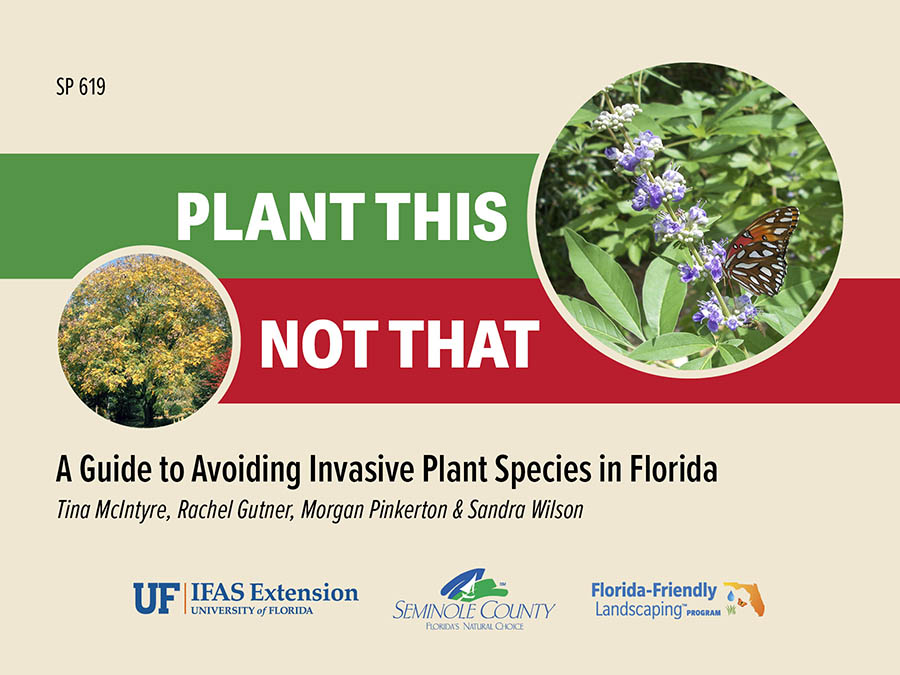Where is IFASBOOKS this weekend?
Saturday, October 23, 8 am – 12 noon:
Master Gardener Volunteer Plant Sale
Discovery Gardens
UF/IFAS Extension Lake County
1951 Woodlea Rd
Tavares, FL
(352) 343-4101
UF/IFAS Extension Lake County To Host Master Gardener Volunteer Plant Sale https://t.co/ECEbW2SzBF pic.twitter.com/aUXiqGzGSu
— South Lake Tablet (@SouthLakeTablet) October 12, 2021
New at IFASBOOKS
Plant This, Not That: A Guide to Avoiding Invasive Plant Species in Florida
Tina McIntyre, Rachel Gutner, Sandra Wilson, Morgan Pinkerton
When it comes to Florida’s invasive species, pythons and lionfish might capture all the headlines, but invasive plants can be just as destructive to our native ecosystems. Each year, the State of Florida spends about $45 million managing invasive plants on conservation acres alone. They’re also an economic headache for agriculture, turfgrass and nursery businesses, who have to deal with invasive (and in some cases, toxic) weeds.
Invasive species enter our state through many pathways, including the sale of ornamental plants. Home gardeners and landscapers looking for a beautiful or unique addition to their landscapes may inadvertently be planting a secret invader that escapes cultivation and spreads rapidly, taking over natural ecosystems and posing a threat to crops and livestock.
The key to controlling the spread of invasive plants is not adding them to your landscape in the first place. Florida has many more hardy, aesthetically pleasing native plants that know how to behave themselves. Unfortunately, many online plant catalogs, garden centers and big box stores don’t alwsys distinguish between native plants and non-native, potentially invasive species.
To help people find safe alternatives to invasive ornamental plants, horticulture agents at UF/IFAS Extension Seminole County have developed Plant This—Not That, an identification guide to landscape trees, shrubs, vines and groundcovers.
Each entry features an invasive plant that is commonly found for sale, including its description, distribution and range, and ecological threat. These bad actors are paired with a list of non-invasive alternative plants and/or approved cultivars to plant instead.
Sometimes it can be difficult to tell the difference between good and bad species or varieties, and Plant This—Not That includes detailed photos, descriptions, botanical and cultivar names to aid with identification. The guide also features an introduction to invasive plants, a list resources and a detailed bibliography for further study.
Plant This—Not That fits in your pocket; it’s a handy tool to have with you when you visit a seasonal plant sale or a nursery. Combined with Florida-Friendly LandscapingTM resources, it can help you make informed decisions that will suit your landscaping needs, and the needs of future generations.
64 pp. $14.99
Also available at IFASBOOKS:
A Step-by-Step Guide to a Florida Native Yard
Ginny Stibolt and Marjorie Shropshire
More and more Florida residents are deciding to replace highly fertilized, over-watered, pesticide-dependent lawns with native plants. They want to reduce their carbon footprints; save time, water, and money; and attract birds and butterflies. But where to begin? This illustrated guide will help you create new outdoor spaces that are both sustainable and beautiful.
University Press of Florida, 2018
136 pp. $21.95
For more, visit the IFAS Extension Bookstore at http://ifasbooks.ifas.ufl.edu/
 0
0



